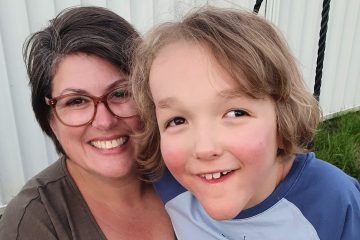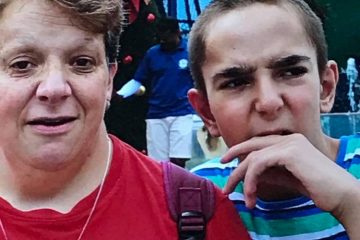When you have a child diagnosed with Sotos Syndrome it’s hard to know what to expect, there is a list of things to watch for and each child will be affected differently. Some start life with a lot of medical issues, which typically improve as they get older. Some have no medical issues and the first time something is suspected, will be a growing realisation that milestones are not being met. Some improve a lot in the first few years of life, others improve more slowly but typically they progress at a pace unique to them. We will share a few stories in this blog series to illustrate the range of experiences.
Today we ‘Google Met’ with Debbie, who is the mum of Rebecca who lives in NSW, who has Sotos Syndrome, and she shares her experience raising Rebecca in this Q+A.
Q: Tell us a bit about Rebecca, from your perspective.
Debbie: Rebecca is 38 years old and lives with me. She’s a very capable young lady (Side note she came and had a brief chat with me too on the call). She enjoys bowling and creative writing. She is a very good writer. She has a very kind heart and a cheeky sense of humour. She is an angel. She goes to university and volunteers all over the place. She likes going to theatre plays and even writes them.
Q: Tell us about how you first became aware that Rebecca had Sotos Syndrome and your diagnosis journey
Debbie: No one knew anything about Sotos Syndrome when she was diagnosed. No Australian Drs had any idea and I had to go out of the country to find out any information about Sotos Syndrome. She was in year 5 when she was diagnosed, early 1990s think 1993. We saw a geneticist and they did suspect Prader Willi because she ate a lot. I took her to Camperdown and they saw her and said there is something, but I can’t tell you what it is. At 8 she was overweight. Eventually they gave her the clinical diagnosis of Sotos Syndrome because there was no genetic testing at the time. They told me it was hereditary and was mainly on the male side, which Drs know is not quite true now. I cried for a week when I was told she had Sotos Syndrome.
Q: What have been the biggest challenges for you as a mum of Rebecca
Debbie: I am a single parent and my husband walked out when she was one. It was all about her needs after that. I had to find everything out myself and I didn’t know what to do to help her – I researched everything! I tried to connect with a few parents in various locations throughout Australia and we found each other through Genetics NSW. I am a rep from Carers NSW and found out about this organisation through their newsletter. There was no early intervention for Rebecca at all – she was in year 5 when she was diagnosed. She had troubles at school. We went to a school of children with behavioural issues for a period and you live there, we were there for 6 weeks. It was a real shock to be there and see some of the children. I made a point of living in the present. I learnt her triggers which were frustration and anxiety. She would be like a time bomb then explode, up to 20 minutes – 45 minutes sometimes. I had holes in the wall and books destroyed at times. 4/5 children with Sotos Syndrome seem to have some sort of anxiety – she still has anxiety and phobias. She can now deal with them a lot better now though! She got very violent when she was younger – which she isn’t now – thankfully, that is long gone. I now have to let her be independent, which is another challenge itself as I am used to caring for her for so long, putting myself last.
Q: What have you enjoyed the most raising Rebecca
Debbie: I am so proud of the way that she has grown in herself. She amazes me sometimes. I got her into Brownies at some stage, then she left because we moved house. I found an activity group, SNAP (Special needs activity program) for kids for mild-moderate ID and she was there on a Saturday morning and I became president and became a spokesperson. When she was 14 she outgrew it, so I had to find something else. I was an advocate and a pioneer – around before NDIS and paved the way for others I like to think.
Q: Were there challenges with Rebecca’s health?
Debbie: She can’t have children and has a weak immune system. If she has a cold, she has it for 3 weeks and gets it bad. She was a sick baby. She needed a feeding tube initially and was in NICU for 2 weeks. She had jaundice and respiratory issues. She also has insulin resistance, which she is on special tablets for. She’s never had scoliosis but has had multiple fractured wrists.
Q: How has Rebecca’s development progressed over the years?
Debbie: She walked at 14 months and speech was not the best. You couldn’t understand her around 3-4, so they thought she had a hearing problem. She used to be introverted but now is more extroverted. Speech was delayed generally. Catching a ball was a bit of a drama. She liked to play with kids younger than her. She’d play with 2-year-old children when she was 3, but the size of a 5-year-old, she was more comfortable with them. She needed support in school, but never got it, so she would bring the work home to me and I would teach her! She found school hard, but we got through. She’s very visually creative and can see things in her head. As a pre-schooler she was about 2 years delayed cognitively, but now goes to university! It was both her and the hard work that I have put into helping her get through school.
Q: Do you have any advice for newly diagnosed parents?
Debbie: Expect the unexpected but don’t look for it as your life stops otherwise. I came up with a philosophy early on, each day is a brand-new day and whatever happens in that day happens! Syndromes are not diseases, you treat what is in front of you, not the disease. Treat the symptoms. Rebecca is Rebecca, she is who she is. She is her own unique person. She has needs that have to be addressed at the same time. I never made her a different person, I treated her the same as everyone else, which maybe wasn’t always right, but she is her own package and given assistance as it is needed. She is different in stature and knowledge, but you would be surprised about what she does know! I told her about her Sotos later in life – she knew she was different earlier, but she wasn’t sure how or why. I’ve recently learnt how creative she is and she loves theatre.
Thank you, Debbie, we really appreciate your time, sharing your perspective with us. You are a pioneer and wonderful mum! Many of us couldn’t imagine a time before a genetic diagnosis, the NDIS or Facebook Groups to support us and our children. No doubt many will learn a lot from reading this! If anyone else would like to be interviewed for our Sotos Syndrome Association Blog or newsletter, please email us at heather@sotos.org.au



0 Comments